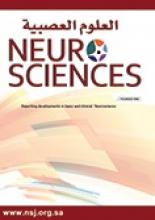Abstract
Objectives: To assess the quality of life for epilepsy patients in Saudi Arabia. Epilepsy, one of the most prevalent chronic neurological conditions in the world, frequently results in a low quality of life.
Methods: This cross-sectional study analyzed data between September 2020 and September 2021 from 102 adult patients with epilepsy in outpatient clinics department of Epilepsy Program at King Fahad Medical City compared it to 108 healthy controls during the same study period. Sociodemographics and clinical data were gathered using the Arabic version of the Rand 36-Item Short Form Survey (SF-36) questionnaire and the Quality of Life in Epilepsy Inventory (QOLIE-31).
Results: Patients with epilepsy had lower SF-36 scores when compared to the control for role limitation due to physical health, role limitations due to emotional health, and general health. The QOLIE-31 revealed that gender was associated with energy/fatigue (p=0.028), medication effect (p=0.016), and social function (p=0.003); only social functioning showed a significant association (p=0.023) with employment.
Conclusion: Quality of life for patients with epilepsy was found to be significantly impacted in Saudi Arabia. Certain factors found in this study differentiate it from data that has already been released. This might be due to Arab differences in family support as well as cultural and religious beliefs.
Footnotes
Disclosure. Authors have no conflict of interests, and the work was not supported or funded by any drug company.
- Received March 12, 2023.
- Accepted August 8, 2023.
- Copyright: © Neurosciences
Neurosciences is an Open Access journal and articles published are distributed under the terms of the Creative Commons Attribution-NonCommercial License (CC BY-NC). Readers may copy, distribute, and display the work for non-commercial purposes with the proper citation of the original work.






